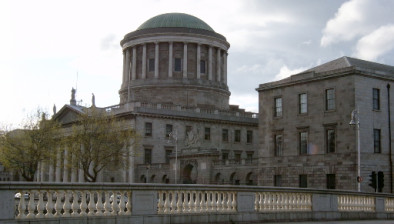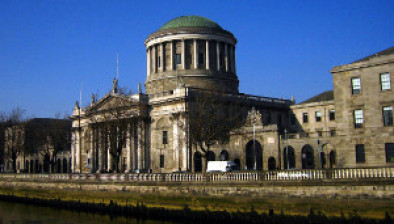Supreme Court: Conviction of mentally ill man for murder of his son was a miscarriage of justice

The Supreme Court has held that the conviction of a mentally ill man for the murder of his infant son in 2001 was a miscarriage of justice. The man had previously spent 16 years in an Irish prison before being officially diagnosed with paranoid schizophrenia. The man was subsequently found not guilty by reason of insanity in a retrial in 2019.

About this case:
- Citation:[2022] IESC 24
- Judgment:
- Court:Supreme Court
- Judge:Mr Justice Peter Charleton
Delivering judgment in the case, Mr Justice Peter Charleton held that the man was entitled to a certificate that a miscarriage of justice had taken place pursuant to section 9 of the Criminal Procedure Act 1993.
Background
In April 2001, the accused was living with his then-wife and infant son. While his son was sleeping, he went into the room and hit the child with enough force to kill him. The child’s mother could not respond in time. The accused had a recent background of exhibiting paranoid delusional behaviour and the family doctor had expressed a view that the accused would need to be involuntarily committed to a mental hospital.
The accused was charged with murder. A first trial did not return a verdict, but the accused was convicted based on a majority verdict in 2003. Prior to the first trial, the State’s doctors only interviewed the man the day before trial. At the first trial, the doctors for the prosecution and defence disagreed as to whether the accused was insane at the time of the killing. At the retrial, a further doctor for the accused testified that he was suffering from paranoid schizophrenia.
The accused was sentenced to life imprisonment and an appeal was unsuccessful. Following conviction, the accused spent four periods in the Central Mental Hospital in 2001, 2005, 2009 and 2013. On discharge in 2013, the accused was diagnosed with paranoid schizophrenia and antisocial personality disorder.
Arising from this diagnosis, the accused challenged his conviction on the basis of a newly-discovered fact. The Court of Appeal was satisfied that the accused’s diagnosis was a newly-discovered fact that had the potential to influence the outcome of the original trial in 2003. Further, the court noted that it was a matter of record that the accused had mental illness and there was no suggestion that the accused only recently developed such symptoms.
The retrial was heard in December 2019, where the expert evidence of the accused was accepted by the jury and a special verdict of not guilty by reason of insanity was returned. In September 2020, the High Court declared that there had been a miscarriage of justice in the case. The court was satisfied that the accused had been acquitted and the newly-discovered facts demonstrated that there had been “a failure of the judicial system to attain the ends of justice”.
The Court assessed the test as follows: “Was the result of the process in 2003 a ‘miscarriage of justice’ in the sense that there was a conviction when there ought to have been an acquittal because of something fundamental which is disclosed by the new material relied on by the applicant?”
The DPP appealed the decision to the Court of Appeal, but the court fully concurred with the decision of the trial judge. While there was no prosecutorial irregularity in the case, the conviction was still wrong in a fundamental aspect, the court held.
The DPP appealed to the Supreme Court. It was submitted that the special verdict in the case did not mean that the accused was acquitted, which might give rise to a miscarriage of justice declaration. Further, it was submitted that there had been a “carriage of justice” in the case and the special verdict was simply the system correcting errors as to conviction.
Supreme Court
Mr Justice Charleton began his judgment by outlining the history of insanity defences in Irish jurisprudence. It was noted that, under the Criminal Law (Insanity) Act 2006, a jury or judge must return a special verdict of not guilty by reason of insanity if the accused was suffering from a mental disorder at the time of the offence.
The consequence of insanity was that a key element of intention was missing from a criminal offence. Accordingly: “An insane person who does not know the nature and quality of the action prohibited under penal sanction, does not commit an offence.” At a fundamental level, insanity operated as an exemption from criminal liability (R v Chaulk [1990] 3 SCR 1303; Doyle v Wicklow County Council [1974] IR 55).
On the burden of proof, the court noted that the defence bore a persuasive burden of proving mental incapacity and that same must be demonstrated as a probability. It is the role of a forensic psychiatrist to analyse the accused and give evidence to enable a jury to determine whether a person was suffering from incapacity at the time of the killing. However, psychiatry was not a science of “precise and unassailable diagnoses” and people were presumed sane unless proven otherwise on the balance of probabilities.
In general, to undermine a conviction after an appeal has been rejected, an accused must demonstrate an error that “goes beyond nuance” and “requires a fundamental defect in the administration of justice” (The People (DPP) v Buck [2020] IESC 16).
In considering the submissions of the DPP, the court held that the accused was acquitted of the murder of his son and that he clearly met the first element of the test in section 9 of the 1993 Act. An acquittal was not a finding of innocence, but a statement that the presumption of innocence had not been displaced beyond a reasonable doubt.
Further, fault on the part of the prosecution was not a requirement under the 1993 Act, but serious fault could be a component in an applicant meeting the test for a miscarriage of justice, the court held (see The People (DPP) v Hannon [2009] 4 IR 147).
Conclusion
In the present case, the court held that a guilty mind was essential to criminal liability, but this was completely absent in the case of insanity. The accused had demonstrated to a jury in a retrial that he was acting in the grip of insanity. He had been acquitted of murder and the analysis of the burden and standard of proof demonstrated the innocence of the accused. As such, a certificate confirming the miscarriage of justice was upheld.
The People (at the suit of the Director of Public Prosecutions) v. Yusif Ali Abdi [2022] IESC 24











